Variegated Snake Plant, Sansevieria trifasciata 'Laurentii', Gold Edged Snake Plant, Mother-in-Law's Tongue 'Laurentii', Devil’s Tongue, African Spear, Bow String Hemp, Bowstring Hemp, Good Luck Plant, Goldband Sansevieria, Viper’s Bowstring Hemp, Magic Sword, Laurentii Snake Plant, Dracaena trifasciata 'Laurentii'
Tolerant of neglect, Sansevieria trifasciata var. laurentii (Variegated Snake Plant) stands out for its ease of care, striking appearance, and air-purifying properties, making it an enduring favorite among houseplants.
Sansevieria trifasciata var. laurentii, commonly known as the variegated snake plant or mother-in-law’s tongue, is a striking and resilient succulent that has gained worldwide popularity for its architectural form and low maintenance requirements. This foliage plant is celebrated for its upright, sword-like leaves with vibrant yellow edges and a pattern of horizontal green stripes. Its architectural form adds a modern touch to indoor and outdoor settings.
Native: Originally from West Africa, it thrives in tropical and subtropical regions but has adapted to indoor environments globally. It belongs to the asparagus family (Asparagaceae), along with agaves and hostas. Botanists recently reclassified the Snake Plant from Sansevieria to Dracaena.
Plant Type and Habit: This is an evergreen perennial plant with an upright growth habit, forming dense clumps of leaves that grow from a rhizomatous root system.
Size: Slow-growing, it typically reaches 2 to 4 feet in height (60-120 cm) with a spread of about 2 feet (60 cm) in its native habitat but is often smaller, 24-30 inches (60-75 cm) on indoor plants.
Flowers: Mature plants produce fragrant, greenish-white flowers on a slender spike in spring under optimal conditions, later producing orange berries. However, flowers and fruit seldom manifest on indoor specimens.
Foliage: The strap-shaped, fleshy leaves are sharply pointed and exceptionally durable, designed to store water efficiently for enduring drought conditions. Exhibiting a deep green color, they’re adorned with light gray-green horizontal stripes and edged with broad, creamy-yellow margins. Emerging rigidly in a rosette formation from a robust rhizome, these leaves are both functional and visually striking.
Hardiness: It is hardy in USDA zones 10 to 12 and is primarily grown as a houseplant in cooler climates due to its sensitivity to cold.
Award: Recipient of the prestigious Award of Garden Merit of the Royal Horticultural Society.
Uses: Widely used in interior design for its air-purifying qualities and as a low-maintenance decorative plant in homes and offices. Also utilized in landscaping in warmer climates. Snake Plants can serve as striking accent plants in xeriscaped gardens, rock gardens, or as part of a succulent collection. Their vertical growth habit and tolerance for neglect make them excellent choices for low-maintenance outdoor areas.
Toxicity: The plant is toxic when ingested, causing nausea, vomiting, and diarrhea in pets and humans, so it should be kept away from children and animals.
Deer and Rabbits: Its toxicity and fibrous leaves generally deter deer and rabbits.
Drought / Salt Tolerance: Highly drought-tolerant due to its succulent nature, it can survive long periods without water, making it an excellent plant for forgetful gardeners. Snake Plants exhibit a notable salt tolerance, making them suitable for environments where many other plants might struggle.
Invasiveness: It is not considered invasive due to its slow growth and easy containment through pot culture.
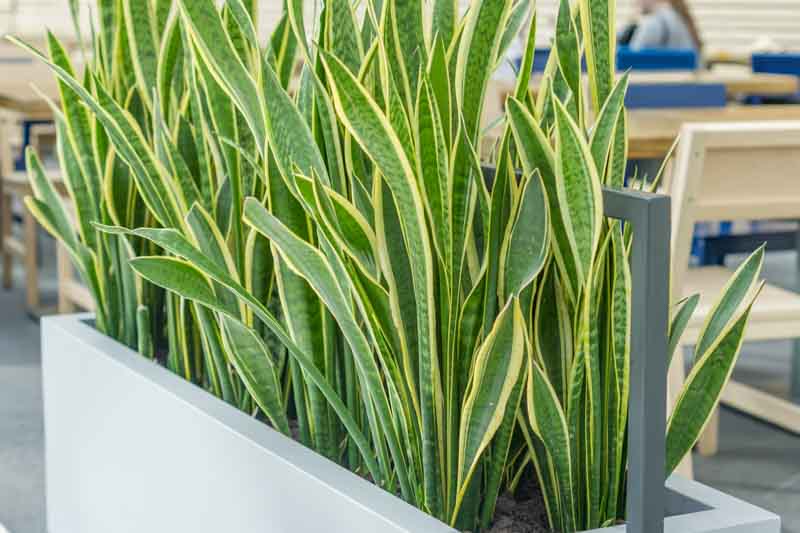
Variegated Snake Plant
Snake Plants offer numerous benefits, making them popular for homes and offices. Here are some key advantages:
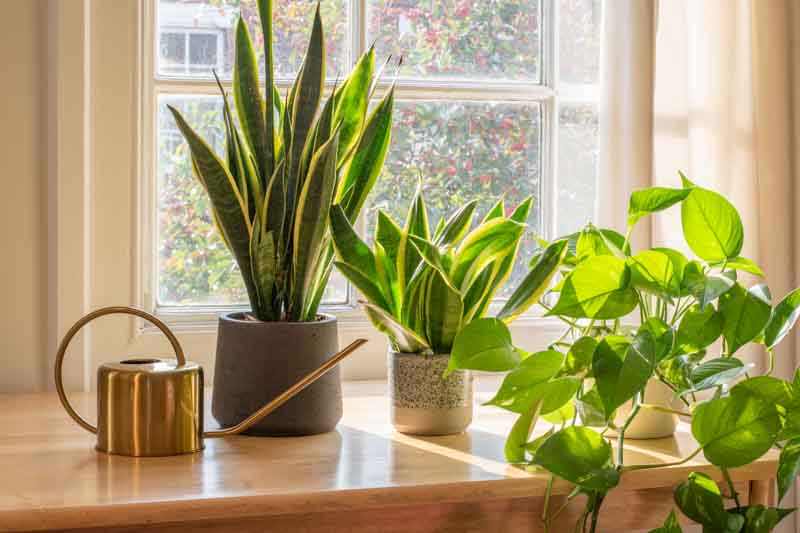
Variegated Snake Plant, Devil’s Ivy
Growing and caring for a Snake Plant indoors is remarkably easy, making it an ideal choice for beginners and seasoned gardeners
Light: Snake plants thrive in eight to ten hours of indirect sunlight or a few hours of early-morning direct sunlight. Excessive direct sun exposure can burn the plant and harm its leaves. While they can tolerate partial shade, insufficient light may hinder growth and fade the plant’s vibrant color.
Soil: Use a well-draining potting mix to prevent root rot. A mixture specifically designed for succulents or cacti is ideal.
Water: Overwatering is the biggest risk to Snake Plants. Water only when the soil is completely dry. In winter, reduce watering to once a month or less, depending on indoor humidity levels.
Temperature and Humidity: Snake Plants are tolerant of a wide range of temperatures but prefer between 60°F and 80°F (15°C – 27°C). They do not require high humidity, making them well-suited to typical indoor environments.
Fertilization: Fertilize with a general-purpose houseplant fertilizer at half strength a few times during the spring and summer months. Avoid fertilizing in the fall and winter when plant growth naturally slows.
Cleaning: Dust the leaves occasionally with a damp cloth to ensure the plant can photosynthesize efficiently. This also keeps the plant looking its best.
Pruning: Prune snake plants in the growing season to spur new growth. Control height by cutting the tallest leaves at the soil line with a sterile tool. Remove damaged leaves anytime, but avoid winter pruning to prevent stress.
Potting / Repotting: Choose a pot with good drainage holes. Snake Plants prefer to be root-bound, so there’s no rush to repot them frequently (3 to 5 years). Signs a snake plant needs repotting include roots emerging from drainage holes, water quickly passing through without retaining moisture, visible root crowding, slowed growth, or the plant becoming top-heavy and unstable. A pot that cracks from root pressure or a plant that looks overly large for its container also indicates it’s time to repot for continued health and growth.
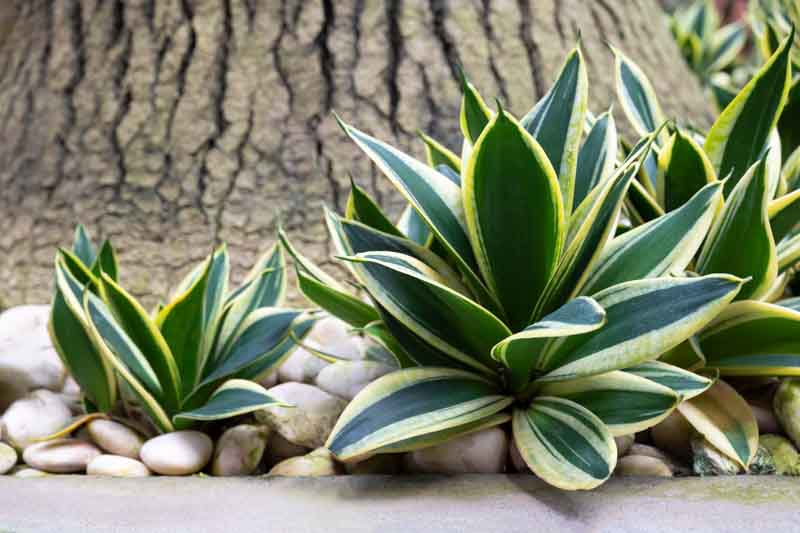
Snake Plant
Growing a Snake Plant outdoors can add an exotic and architectural element to your garden, but it’s important to consider the plant’s native habitat and care requirements.
Hardiness Zones: Snake Plants are suited to USDA Hardiness Zones 10-12 for outdoor cultivation. They need to be protected from frost and freezing temperatures, as they are not cold-hardy.
Temperature: Ideal temperatures range from 70°F to 90°F (21°C to 32°C) but can tolerate lower temperatures down to about 50°F (10°C) without harm.
Light: While Snake Plants are adaptable to various light conditions, they prefer bright, indirect sunlight outdoors. In regions with intense sun, provide some shade to prevent leaf scorching.
Soil: Plant in well-draining soil to prevent root rot. If your garden soil is heavy or clayey, consider using raised beds or planting in containers to improve drainage.
Planting: Ensure the planting site or container allows excess water to drain away. Elevate the plant slightly above the soil line to further enhance drainage.
Water: Water more frequently than you would indoors, but still allow the soil to dry out between waterings. Outdoor plants in hotter, sunnier locations may need watering once a week, while those in cooler, shadier spots may require less.
Fertilization: Apply a balanced, slow-release fertilizer at the beginning of the growing season to support growth. Avoid over-fertilizing, which can harm the plant.
Mulching: Applying a thin layer of organic mulch can help retain soil moisture and regulate soil temperature, benefiting outdoor Snake Plants.
Winter Care: If you live outside of zones 10-12, consider growing Snake Plants in containers that can be moved indoors to protect them from cold weather.
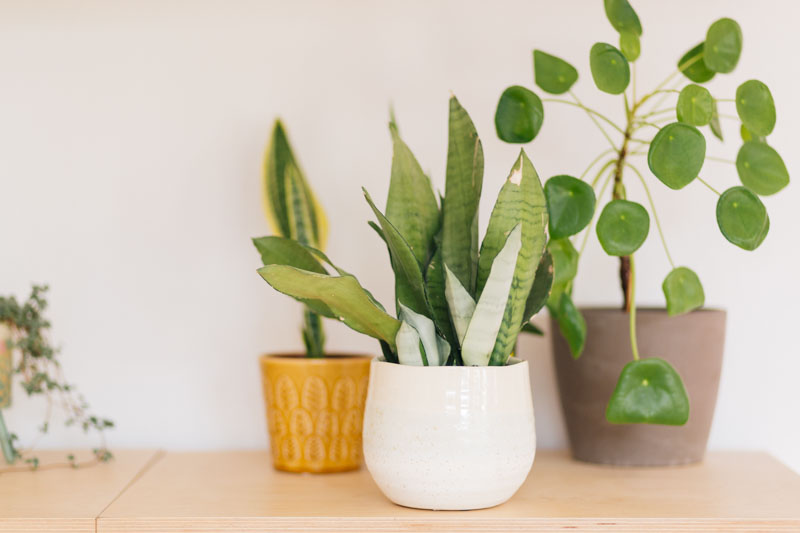
Snake Plant ‘Moonshine’, Variegated Snake Plant, Chinese Money Plant
Propagating a Snake Plant (Sansevieria trifasciata) is a straightforward process that can be accomplished through several methods. Here’s how to propagate your Snake Plant successfully:
Cut: Select a healthy, mature leaf and cut it into segments about 2-3 inches long. Make sure to note the top and bottom of each segment.
Dry: Let the cuttings dry for a day or two until the cut ends callous over to prevent rot.
Plant: Dip the bottom end of each segment in rooting hormone (optional) and plant it about an inch deep in moist, well-draining potting mix designed for cacti or succulents.
Orientation: Ensure the cuttings are planted in the same direction they were growing to avoid confusion and ensure proper rooting.
Care: Place the pot in indirect light and water sparingly, just enough to keep the soil slightly moist.
Rooting: In a few weeks to months, roots and new shoots will emerge. Patience is key, as this method can be slow.
Cut: Similar to soil propagation, cut a healthy leaf into segments or use whole leaves. Remember the top from the bottom.
Submerge: Place the bottom part of the cuttings into a glass or jar of water, ensuring only the bottom inch is submerged to prevent rot.
Change Water: Regularly change the water to keep it clean, every few days to a week.
Rooting: Roots should begin to form in a few weeks. Once a good network of roots has developed, you can pot the cuttings in soil.
Unpot: Carefully remove the Snake Plant from its pot and gently shake off excess soil to expose the roots.
Divide: Identify natural divisions and use a clean, sharp knife to separate them, ensuring each division has at least one growth point (leaf or bud).
Pot: Plant each division in its own pot filled with a well-draining potting mix. Water lightly to settle the soil around the roots.
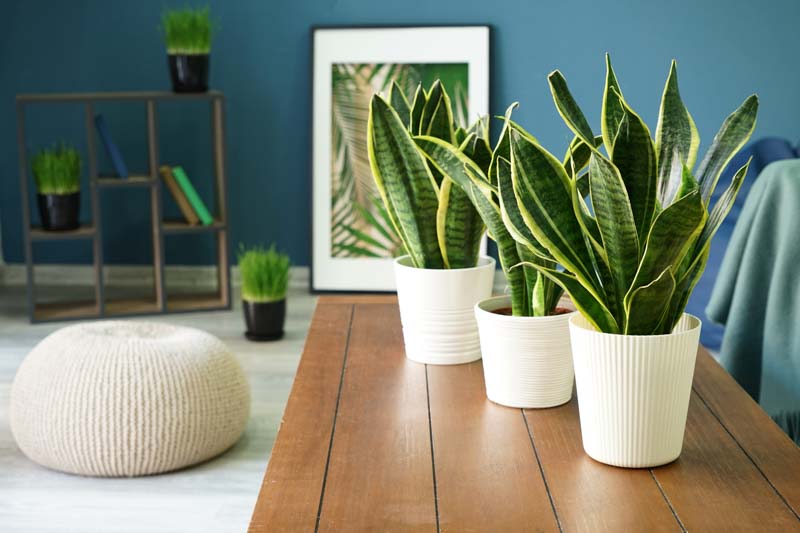
Variegated Snake Plant
Snake plants are vibrant tropical plants that can sometimes encounter pests, diseases, and common problems.
Spider Mites: These tiny pests thrive in dry conditions, sucking sap from leaves, leading to yellowing and webbing. Increase humidity and wash plants with water; use miticides if necessary.
Mealybugs: Look for white, cottony masses on stems and undersides of leaves. Remove with alcohol-dipped cotton swabs or apply insecticidal soap.
Fungus gnat: These pests thrive in moist soil. Let the soil dry out between waterings, and use sticky traps or a diluted hydrogen peroxide solution to control their population.
Aphids: Small, pear-shaped pests that cluster on new growth and undersides of leaves, sucking plant sap and weakening it. They excrete sticky honeydew, attracting ants and promoting sooty mold growth.
Scale insects: Hard, dome-shaped pests that attach firmly to stems and leaves, feeding on sap. Their presence can lead to yellowing leaves, stunted growth, and a decline in plant health.
Root rot: Overwatering is the primary cause of root rot, which is a fungal issue. Prevent by ensuring well-draining soil and pots, and only water when the soil is dry.
Leaf spot: Caused by fungal or bacterial infections, resulting in discolored spots on leaves. Improve air circulation, reduce leaf wetness, and treat with fungicides if necessary.
Brown Tips or Edges: Often a result of low humidity, under-watering, or fluoride in tap water. Use distilled or rainwater and ensure consistent watering.
Yellowing Leaves: Can indicate overwatering, poor drainage, or a need for fertilization. Adjust watering habits and ensure the pot and soil allow for proper drainage.
Wilting or Drooping Leaves: Usually due to overwatering, root rot, or extreme underwatering. Check soil moisture and adjust your watering schedule accordingly.
Lack of Growth: A common issue when the plant is pot-bound or in need of nutrients. Consider repotting into a slightly larger container with fresh potting mix or applying a balanced, water-soluble fertilizer.
Lighting: While Snake Plants are tolerant of low light, too little light can lead to leggy growth. Conversely, direct sunlight might scorch the leaves. Find a balance with indirect, bright light for optimal growth.
Temperature Stress: Extreme cold or drafts can damage the plant. Keep it in a room with temperatures above 50°F (10°C).
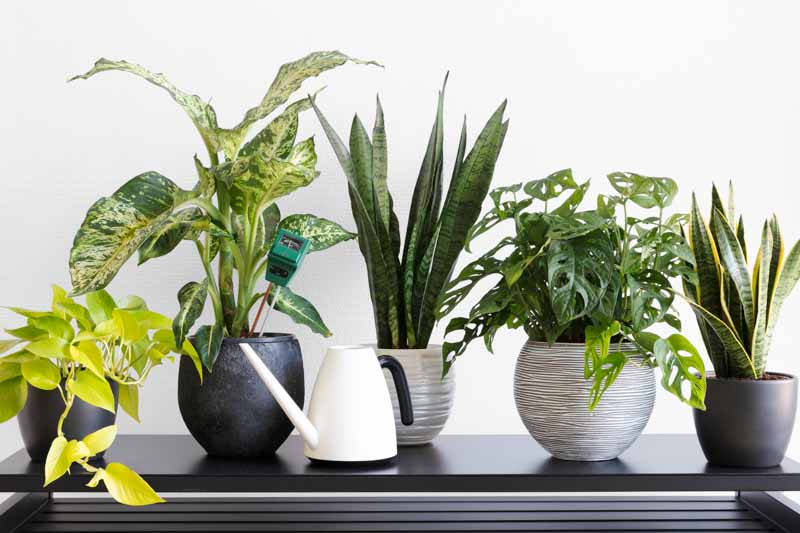
Yes, Snake Plants are toxic to cats. They contain saponins, which can cause nausea, vomiting, and diarrhea if ingested. It’s best to keep the plant out of reach of curious pets.
You can propagate Snake Plants by leaf cuttings or division. For leaf cuttings, cut a healthy leaf into segments and plant them in soil or water until roots develop. For division, separate the plant into smaller sections, ensuring each has roots, and repot them.
Yes, Snake Plants are also toxic to dogs for the same reasons as cats. Ingesting the plant can lead to symptoms such as nausea, vomiting, and diarrhea. Keep the plant away from dogs.
Water your Snake Plant every 2-6 weeks, depending on light and humidity. Let the soil dry out completely between waterings. They are drought-tolerant and prone to root rot if overwatered.
Care for Snake Plants by placing them in indirect light, watering only when the soil is dry, and keeping them in well-draining soil. They thrive on neglect, so avoid overwatering and fertilize sparingly.
Repot a Snake Plant when it becomes root-bound. Choose a pot slightly larger than the current one. Remove the plant, untangle roots gently, place it in the new pot with well-draining soil, and water lightly.
Snake Plants can live outside in warm climates (USDA Zones 10-12). They need protection from direct sunlight and heavy frost. In cooler zones, they can be outdoors in summer but should be brought inside before temperatures drop.
Yes, Snake Plants can flower, producing greenish-white, fragrant flowers on a slender spike, but this is rare, especially indoors. Flowering typically occurs under stress or in very optimal conditions.
| Hardiness |
10 - 12 |
|---|---|
| Heat Zones |
1 - 12 |
| Climate Zones | 13, 23, 24, H1, H2 |
| Plant Type | Houseplants, Cactus & Succulents, Perennials |
| Plant Family | Asparagaceae |
| Genus | Dracaena |
| Common names | Snake Plant |
| Exposure | Full Sun, Partial Sun |
| Season of Interest |
Spring (Early, Mid, Late) Summer (Early, Mid, Late) Fall Winter |
| Height |
2' - 4' (60cm - 120cm) |
| Spread |
1' - 2' (30cm - 60cm) |
| Spacing |
18" - 24" (50cm - 60cm) |
| Maintenance | Low |
| Water Needs | Low |
| Soil Type | Loam, Sand |
| Soil pH | Alkaline, Neutral |
| Soil Drainage | Well-Drained |
| Characteristics | Plant of Merit, Showy, Evergreen |
| Tolerance | Drought, Salt, Deer, Rabbit |
| Garden Uses | Patio And Containers |
| Garden Styles | Coastal Garden, City and Courtyard, Mediterranean Garden |
| Hardiness |
10 - 12 |
|---|---|
| Heat Zones |
1 - 12 |
| Climate Zones | 13, 23, 24, H1, H2 |
| Plant Type | Houseplants, Cactus & Succulents, Perennials |
| Plant Family | Asparagaceae |
| Genus | Dracaena |
| Common names | Snake Plant |
| Exposure | Full Sun, Partial Sun |
| Season of Interest |
Spring (Early, Mid, Late) Summer (Early, Mid, Late) Fall Winter |
| Height |
2' - 4' (60cm - 120cm) |
| Spread |
1' - 2' (30cm - 60cm) |
| Spacing |
18" - 24" (50cm - 60cm) |
| Maintenance | Low |
| Water Needs | Low |
| Soil Type | Loam, Sand |
| Soil pH | Alkaline, Neutral |
| Soil Drainage | Well-Drained |
| Characteristics | Plant of Merit, Showy, Evergreen |
| Tolerance | Drought, Salt, Deer, Rabbit |
| Garden Uses | Patio And Containers |
| Garden Styles | Coastal Garden, City and Courtyard, Mediterranean Garden |
How many Sansevieria trifasciata var. laurentii (Variegated Snake Plant) do I need for my garden?
| Plant | Quantity | |
|---|---|---|
| Sansevieria trifasciata var. laurentii (Variegated Snake Plant) | N/A | Buy Plants |
Create a membership account to save your garden designs and to view them on any device.
Becoming a contributing member of Gardenia is easy and can be done in just a few minutes. If you provide us with your name, email address and the payment of a modest $25 annual membership fee, you will become a full member, enabling you to design and save up to 25 of your garden design ideas.
Join now and start creating your dream garden!
Create a membership account to save your garden designs and to view them on any device.
Becoming a contributing member of Gardenia is easy and can be done in just a few minutes. If you provide us with your name, email address and the payment of a modest $25 annual membership fee, you will become a full member, enabling you to design and save up to 25 of your garden design ideas.
Join now and start creating your dream garden!